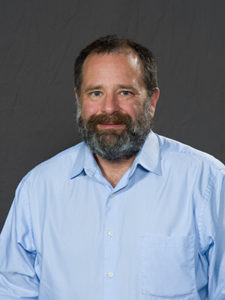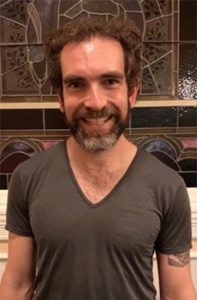IU East’s online math program stays ahead of the competition
When you are one of the best, you focus on staying the best – and getting even better.

Markus Pomper is the department chair for mathematics and an associate professor for the IU East School of Natural Science and Mathematics.
You keep building a better community and better communications. And you develop solid plans to keep you ahead of the competition.
Indiana University East finds itself in those positions with its burgeoning online math program, which has grown from nine to 350 students in 11 years.
The growth is likely to continue in the near future because of a positive mix of reasons that include high national rankings and positive reviews around the web.
“Students are very interested in us right now and we want to stay ahead of the curve,” says Markus Pomper, department chair and associate professor of mathematics at IU East. “What sets us apart is we really engage our students. We tailor to students who otherwise wouldn’t be able to attend.”
Other top reasons cited by students for seeking degrees through IU East include: flexibility of study time, low costs, friendly interactions and the ability to transfer many credits for previous collegiate work.
Pomper doesn’t want online students just studying and taking tests. He wants them to be involved in the process of learning – with their teachers and with their fellow students – even though most will never set foot on the campus in Richmond. “We want to create community,” he says.
The program has been a perfect fit for current student Alex Ness, a musical composer and private tutor from San Francisco.
“It feels great to be in a community, very diverse, very friendly,” Ness says. “There’s a lot of work done by the professors to make the atmosphere friendly. It feels good to contribute to the class.”
Despite the uncertainties created by the COVID-19 pandemic, enrollment is still expected to accelerate as students moved to all-online classes and IU East has responded.
“I believe that online education will develop more and more,” says Nayeong Kong, assistant professor of mathematics. “At the beginning of quarantine, other universities were in a panic to start online teaching. But now they realize that (it) is essential and necessary for education in the future. And in my opinion, I think that online teaching will be the standard and general form of education in the future.”
In that realm, she and Pomper are devising plans to keep IU East attractive to a diverse range of students who could live anywhere and be at any stage in their careers.
“We are trying to meet all the demand as we can,” Pomper says. “We know what we are doing. We found ways to communicate, to make classes engaging and interactive.”
He and Kong met this summer to plan more ways to tailor the program to address more needs and challenges of students.
They aim to use platforms such as Canvas and Zoom to create more instructor-student interactions and to offer more feedback.
They also aim to focus more of the curriculum on the process and path to an answer, not just on a correct answer.
Pomper hopes to add classes in finance in the near future that are geared toward professional testing.
Kong started working in online education just last year after being hired at IU East. She quickly came to see its virtues, its values and areas of opportunity.
“Engaging students is a weak part of online teaching. To overcome this weak point, I need to provide homework problems and quizzes every week,” she says. “And then I need to use online office hours and discussion sessions on Canvas well.”
Kong also has been challenged personally during the pandemic — in a wonderful, stay-at-home way. She and husband, Seonguk Kim, welcomed a baby named Rian in mid-July.
Pomper and Kong provide regular Zoom office hours for students to work through math problems.
“Students typically ask questions and I answer them. They can see me writing and talking and know what is going on,” Pomper says. “We are very cognizant that students don’t learn in isolation. They will take anything that helps along the way.”
He takes a poll at the start of each semester to find out the best time to hold the hour-long office sessions, but they also are recorded so any student can watch them later.
Online learning can take place anywhere and at any time. Students can take part wherever the web can reach. They can live halfway around the world or on the East or West Coasts. They can live in eastern Indiana and have family and job commitments that make it better to take classes from home. They could constantly be on the move as soldiers, pro-athletes, musicians, doctors or business travelers.
Pomper vividly recalls this fluid situation that found a flexible solution after a man faced a travel and housing crisis in the middle of his senior seminar class.
“He had been living in Eastern Europe, but needed to return home to the U.S. when the pandemic started,” Pomper said. “For a few weeks, he was shuffling around at friends and relatives, sleeping on couches and spare bedrooms, until he could find a permanent place where he could set up his computer. We managed to get him to graduation.”
That whatever-it-takes graduation focus is standard in the online math program at IU East, where flexibility is a major attraction. Some online students take classes full-time, while others take classes one at a time; some go year-round while others stick to a traditional school year.

Alex Ness of San Francisco is pursuing his mathematics degree online at IU East. Ness is musician who is using his math knowledge to electronically alter his music. With a bachelor’s degree from Harvard College and a master’s from New York University, Ness plans to use his mathematics degree to qualify for teaching credentials and to explore mathematical uses in musical composition. He is an educational consultant for Scholar Co. in San Francisco.
It could take a year to complete a degree or two years or four or eight.
Some even step away from the program periodically “and pick up where they left off,” Pomper says. “We cater to that; let them take their time.”
Many online students already have college degrees. The majority of them take classes “specifically for their careers,” he says. “Some want to go to graduate school or continue in business and finance.”
Mary Evanston earned a bachelor’s degree in math this year and has qualified for the engineering master’s program at the Johns Hopkins University Whiting School of Engineering in Artificial Intelligence.
“Mary is a professional,” Pomper says. “She chose this program because it allows her to forge ahead in her career.”
Evanston has been employed full-time as a Federal Business Development Executive in the Washington, D.C., area.
Zoe Skovgaard Asta, a librarian in Denmark, earned a bachelor’s degree online this year and enjoyed the experience so much that she now is working toward a master’s certificate in math from IU East.
For more in-depth information on Evanston and Asta, see the accompanying story.
Ness, age 37, aims to complete his online bachelor’s degree within the next year.
IU East offers the flexibility he needs with a busy and multifaceted professional life. “You don’t need to commit your whole life to it,” he says.
The program offers another major appeal, especially for non-traditional students who already hold degrees in other fields. They can get credit for classes earned at other institutions. That means it’s possible to earn a bachelor’s in math online by taking just 40 hours of core classes.
“We make sure we count work they have completed before,” Pomper says. “If they have a B.S. in business, or in any other discipline, they don’t need to take general-education courses.”
Ness graduated magna cum laude with a bachelor’s degree from Harvard College and also earned a master’s degree from New York University in music.
He serves as an educational consultant for Scholar Co. in San Francisco. He also helped found Playground Sessions, a music-education software company based in New York City, where he has worked alongside music icons like Quincy Jones and YouTube piano star David Sides.
Playground blends software with the human touch for students to learn to play musical instruments.
Ness wants a math degree for several reasons: to qualify for teaching credentials, to explore mathematical uses in musical composition and to more deeply explore the subject.
“I always had an interest in math, but focused on music and music technology instead,” he says. “I took math courses for fun. That made it easy to pick up where I left off.”
When it became time to pick it up again, he started looking for online programs. “IU East popped up as a reputable program with good credentials and was well reviewed,” he said. “The enrollment was totally painless. It was very smooth getting in.”
It’s been smooth sailing since then for Ness. He has enjoyed online classes and the camaraderie at IU East that includes active student forums. “There’s more social interaction than with traditional classes,” he says. “When you share online, you have time to digest a post, talk and work things out.”
He’s definitely an advocate of taking online classes mid-career.


